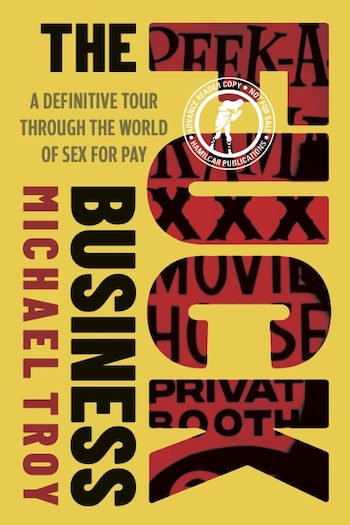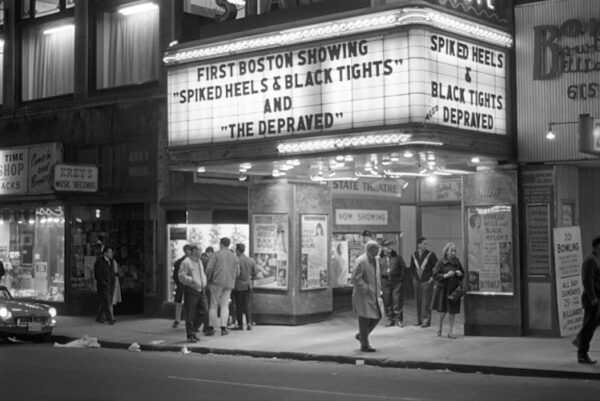Book Review: “The Fuck Business” – Chronicling Sex Workers on the Clock
By Ed Symkus
Here’s a look at the – pardon the expression – ins and outs of a very specialized industry, a story about coming of age in Boston’s long-gone Combat Zone.
The Fuck Business by Michael Troy. Hamilcar Publications, 184 pages, $21.99 (paperback), $34.99 (hardcover)
 George Eliot was wrong. You can, indeed, judge a book by its cover. At least in the case of the splendidly gaudy, straightforwardly titled The Fuck Business. The subtitle lays it all out: A Definitive Tour of the World of Sex for Pay. And what you see (there) is what you get.
George Eliot was wrong. You can, indeed, judge a book by its cover. At least in the case of the splendidly gaudy, straightforwardly titled The Fuck Business. The subtitle lays it all out: A Definitive Tour of the World of Sex for Pay. And what you see (there) is what you get.
The author, Michael Troy, reveals little of his own background. We only learn that he was born in Cambridge, later lived out of the country, has resettled in Massachusetts, and is retired. In addition to the various illegal professions portrayed in the book, he has worked extensively in the music business.
But Troy’s quite clear about what is going to be described in the volume’s pages. In the introduction, he writes, “This is a book about fucking. Specifically, it’s a book about people who get paid to fuck and the people who pay to fuck them.” For any delicate flowers out there, he adds, “Nobody is making you read it.”
The table of contents is transparent about what’s inside. Typical section headings: “The Hidden Combat Zone: Years Later,” “Business Within the Zone,” “The Whorehouse,” and “Customer.” Chapters are titled “Hippie Girls and Hygiene,” “Some Whorehouse Facts: Things You Could Turn Down While Working at the Whorehouse,” and “Don’t Fuck Around with a Pro.”
Opting for a chronological structure (running from 1961-2023), Troy fills his yarn with brief but detailed depictions of people, places, and the times, along with his own recollections of how he took part in the story he is telling. It’s a Bostonian memoir imbued with historical context. And he offers readerly pleasure; Troy boasts a commanding way with words, providing compelling and insightful stories about the sex worker biz.
From the outset, Troy serves up a parade of fascinating folks, mostly centering on hookers and pimps and their clientele. He supplies acute looks at people who are living on the edge, admitting that he is one of them. Troy also candidly reveals his own sexual exploits, running from the age of 12 up to his early 70s, part of the chronicle focusing on his time spent as a paid stud.
Among the book’s cast of colorful characters, some are saddled with sadness, others are doomed. Troy describes these lives with considerable tenderness. A story about a prostitute named Ann, with whom Troy believes he was falling in love, turns heartbreakingly tragic. Portions of the book are also hilarious. On a trip to Washington, D.C., Troy suddenly develops the urge to have sex with “the whitest white woman and the blackest black woman at the same time.” An odd sexual encounter involving Tammy and Ed and their loquacious pet cockatoo supplies another kinky highlight.
Brief but memorable character portraits include Holly, “whose looks rendered all the other women peripheral or, worse, objects of dismissal and even ridicule,” and Angela, a stripper in her 50s, who could perform upside-down – “stripping, singing, emceeing, telling jokes, and – if it came to that and someone was willing to pay enough – fucking.” Whether it’s these two or the hookers who make their livings in back alleys of Boston, Troy shows a great deal of empathy for most of the women he writes about.
In addition, Troy is not afraid to tell some harsh truths: “Street-level prostitution is a business largely peopled by unimaginative but dangerous individuals of slightly substandard capabilities. Theirs is a life that keeps them literally walking in circles, making the same rounds night after night, seeing the same people, doing the same things. It’s a life that not only militates against progress, but that almost guarantees – since aging equates to continually lowering market value among the hookers and continually diminished efficacy for the pimps – a slow decline that culminates in total marginalization.” Here’s a provocative generalization: “Women who provide sex for money are seldom any good at it. They’re mechanical or they’re falsely demonstrative or they’re watching the clock.” About himself, later in the book: “At this point, I was in my late teens, married to one woman, living with another who had my son, in love with a third and maybe a fourth, and fucking as many others as I could. I understood that my life was in turmoil, so was buying a day or even part of a day at a time, postponing the avalanche that was inevitable.”

State Theatre, Boston, 1967. Photo: Wiki Common
Troy can get carried away with his linguistic ambition, sometimes losing himself in wordplay as if he wants to convince us of his erudition. He tosses in words that I had to look up: frottage, bibelots, ecdysiasts, lubricious, and otiose among them. But, hey, at least I can now use them in sentences.
As time goes by, Troy’s life becomes crazier and his rationalizations more frayed: “It wasn’t my intention to be in the fuck business. Turning thirty, my goals had been more ambitious and more unrealistic. But somehow these ambitious and unrealistic goals brought me directly to running a whorehouse for a few years … in an affluent residential neighborhood.” An entertaining account of the experience serving the desires of the upper class follows.
Near its end, The Fuck Business drifts a bit, particularly when the action moves to Puerto Rico and the story and mood lose their focus (and are soon found). But that’s a minor complaint. The Fuck Business presents a slice-of-life peek-a-boo at a world most of us don’t know, or if we do, not nearly as well.
Ed Symkus is a Boston native and Emerson College graduate. He plays guitar, went to Woodstock, has interviewed John Irving, Joyce Carol Oates, Dennis Lehane, and Roddy Doyle, and has visited the Outer Hebrides, the Lofoten Islands, Anglesey, Mykonos, Nantucket, the Azores, Catalina, Kangaroo Island, Capri, and the Isle of Wight with his wife Lisa.

Ed! I won’t ask what drew you to this book since it did increase your vocabulary, albeit with words an elderly gentleman might not be prone to regularly engage. Nevertheless, as far as books go, I appreciate the hot tip (no pun intended).